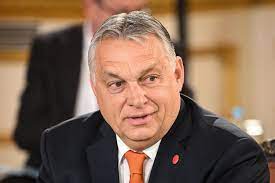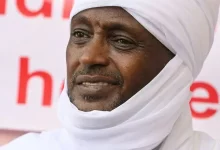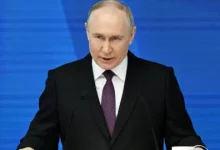
Hungary’s nationalist Prime Minister (PM), Viktor Orban, has been congratulated by Russian President Vladimir Putin after he won a fourth term by a landslide in the country’s general election.
His right-wing Fidesz party had 67.8 per cent of votes with almost 99 per cent counted.
The opposition alliance led by Peter Marki-Zay was far behind with 28.1 per cent.
The Kremlin says Mr Putin expressed confidence that the two countries could develop further ties “despite the difficult international situation”.
In his victory speech, Mr Orban criticised Brussels bureaucrats and Ukraine’s President, Volodymyr Zelensky, calling them “opponents”.
Mr Zelensky has repeatedly criticised Mr Orban’s ban on the transfer of arms to Ukraine, with which it shares a border.
Based on preliminary results, the National Election Office said Fidesz would have 135 seats, a two-thirds majority, and the opposition alliance would have 56 seats.
The victory will be Fidesz’s fourth successive win since 2010.
Mr Orban, 58, has had a fraught relationship with the European Union (EU), which considered that Fidesz had undermined Hungary’s democratic institutions.
The BBC’s Nick Thorpe in Budapest said that while Hungary had welcomed more than half a million refugees from Ukraine and had joined EU sanctions on Russia, Mr Orban has been cautious in his criticism of Moscow and insisted that there should be no attempt to block the sale of Russian gas and oil to Europe.
Several other EU countries, including Germany and Austria, were also wary of sanctioning Russian fuel, and Mr Orban could be expected to seek their support for his position, our correspondent added.
Mr Marki-Zay admitted defeat late on Sunday evening.
He said the opposition had done “everything humanly possible”, but the campaign had been “an unequal fight” as anti-Fidesz politicians had got so little showing in state media.
European election observers said the election, though well run, was marred by the lack of a level playing field for candidates.
“The pervasive overlap between the governing party’s campaign messages and the government’s communications tilted the playing field,” said Jillian Stirk, an official from the Organisation for Security and Co-operation in Europe. -BBC






